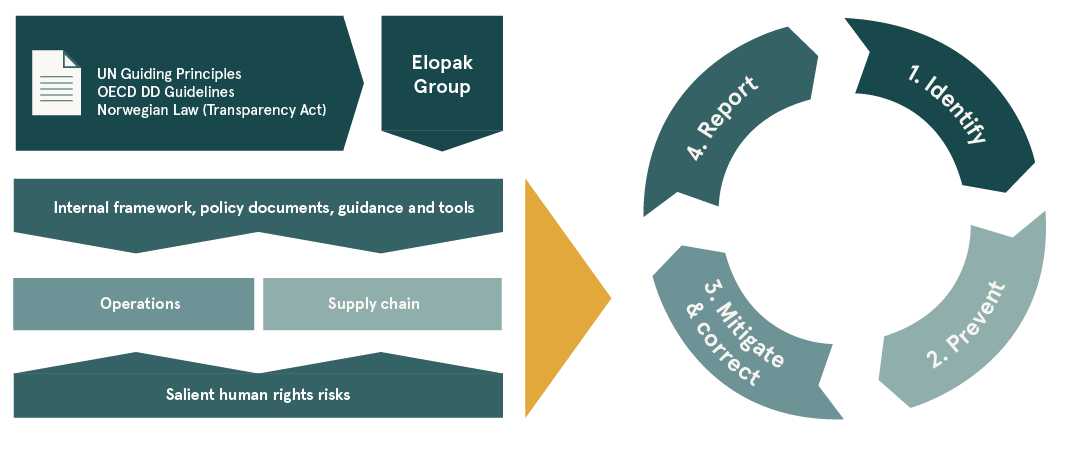Human and labor rights

Elopak respects and promotes international human rights and is committed to implementing systems that minimize risks of human rights breaches and remediating any negative impact on individuals affected by our operations. We aim to continuously improve the work we do in this area.
Elopak respects all applicable laws, rules, regulations, and industry standards concerning working hours, minimum wages, and the working environment, in line with human rights as defined by the United Nations. This is also reflected in our Code of Conduct. All our employees and consultants have an equal right to a workplace that is safe, healthy and free from discrimination. Our Code of Conduct represents a commitment for how all Elopak employees shall act towards other employees, communities, customers, suppliers, environment and other business partners of Elopak.
In June 2021, the Norwegian Parliament adopted the “Norwegian Transparency Act”, which intends to ensure that companies respect fundamental human rights and decent working conditions in their operations and supply chains. Elopak welcomes such initiatives, which are in line with our responsible way of doing business.
Approach
Human Rights
Human rights are included in Elopak’s risk management processes and embedded in our compliance program.
Elopak issues a Modern Slavery transparency statement annually, describing what we have done to ensure that potential risks of slavery and human trafficking are identified and adequately managed within our business and supply chains. This is signed off by our Board of Directors.
By engaging actively with human rights due diligence in their supply chains, companies can contribute to improving the rights and livelihoods of millions of workers globally, while significantly reducing the risk of their business operations contributing to harm on people, societies and the environment.
Kaja Elise Gresko, Advisor, Ethical Trade Norway

Supply Chain Human rights risk assessment
In 2021 we conducted a high-level review and risk assessment of our supply chain in order to identify key Human Right risk topics and our Human Rights due diligence priorities. This will better allow us to prioritize and channel our resources and efforts. The approach is based on OECD’s due diligence guideline for responsible business conduct.
Our main focus is our salient human rights issues in our supply chain, which are opposing forced and child labor as well as safeguarding the right to decent working conditions and the right to health and safety.
Elopak has a risk-based approach to supply chain human rights due diligence. In order to address issues more efficiently with our suppliers, we will focus on prioritized areas. The priorities have been identified considering scope, scale, irreversibility and likelihood of occurrence. In addition, we have also considered:
- Geography/Country risk
- Activity/risk to people – e.g. level of manual work, use of unskilled labor, hazardous work, etc.
- Elopak’s influence – e.g. spend and strategic importance

Using this approach, we prioritize the following categories:
- Raw material categories (board, aluminum, inks & solvents, polymers)
- Logistics & transport
- Filling Machines
- Catering and cleaning services
- Maintenance
The result of the initial risk assessment indicated a potential link between Elopak’s supply chain (sub-supplier) and forced labor, where one significant finding was found for one of the entities. Based on the result, an external in-depth due diligence was carried out to further assess the risk, which did not indicate any direct link or further indirect link to forced labor. Other mitigating actions include, among others, dialogue and follow-up with the supplier.
In line with our risk-based approach, we aim to conduct more thorough human rights impact assessments for the prioritized areas with mitigating actions and follow-up plans where there is a higher risk for adverse human rights impacts.
Should we detect or be informed of human rights risks or adverse impacts in the non-prioritized areas of our supply chain, we will take appropriate action to mitigate risks there as well.
By having a proactive approach to Supply Chain Human Rights due diligence, we can make a positive contribution to securing decent working conditions, not only in our own operations, but throughout our supply chain.
Sandra Färdigh, Director Group Procurement

Labor rights
Elopak’s focus on decent labor and working conditions is maintained through various policies, procedures, guidelines, and training available to all employees. Our speak-up culture and whistleblower helpline is another element safeguarding the well-being of our employees.
Local management and HR maintain a close formal and informal dialogue with the local works councils regarding health, safety, the work environment during organizational changes, and preventive actions to uphold a healthy working climate.
Performance
Targets
Target to be defined
Strive for decent working conditions and no gross violations of human rights throughout our supply chain

KPIs | KPI reference |
a) % in collective bargaining agreements b) % completed human rights training c) Significant actual and potential negative social impact identified in the supply chain | GRI 102-41 GRI 412-2 GRI 414-2c |
Status 2021 | |
a) 51% b) Not specifically measured c) See text |
We continuously work to improve our Responsible Supply Chain procedure and framework and to embed human rights due diligence into our procurement processes. You can read more about our Responsible Supply Chain framework and work here.
51% of our workforce are covered by National Collective Bargaining Agreements, a significant increase from last year’s report of 28%. Unfortunately, the collective bargaining agreements in the two plants in the Netherlands and Ukraine were not included in previous year’s calculation. Employees in Europe are organized in the European Work Council. In addition, we keep employees informed and engaged in the business through frequent team dialogues, our internal communication channels, and town hall meetings. Elopak aims to notify employees, often through unions, in good time before the implementation of any significant operational changes that could substantially affect employees. In our agreements with one union, there is an eight-week notice requirement for any such change.
Moving forward
In 2022, we will continue our focus on human and labor rights, further developing the human rights due diligence framework and performing a human rights risk assessment for our own operations. Based on the human rights risk assessment of our operations, we can refine our KPIs in this area. For our supply chain, we will continue scoping out the top risks for Elopak in key categories and defining risk mitigation actions. Further Governing documents on human rights will be implemented to strengthen Elopak’s focus on human rights. We continuously evaluate the need for appropriate training for both our operations and our supply chain. Labor rights will continue to be an important priority, particularly for implementation of new operations.

Case
European Works Council (EWC)
The European Works Council comprises Works Council representatives from all Elopak legal entities within the EU countries (plus Norway, Iceland, Lichtenstein). All legal entities with more than ten employees are entitled to send one representative. Some smaller legal entities are merged and presented by one person.
The EWC delegates meet with management once a year to be informed about strategy, financial results, and updates from different parts of the organization. The agenda for the annual meeting is established by delegates and management in cooperation.
The delegates elect a Working Party comprising five delegates and two substitutes who have bi-monthly meetings with management. These regular meetings ensure a continuous information flow between management and EWC. The Working Party is obliged to share the received information with their local Workers Councils.
For extra-ordinary major or transnational matters such as restructuring, organizational changes, or projects affecting manning/resources, separate meetings are arranged to inform and consult the EWC before the rest of the organization is informed.
Elopak strives to maintain an open and trustful dialogue and relationship with the European Works Council.
